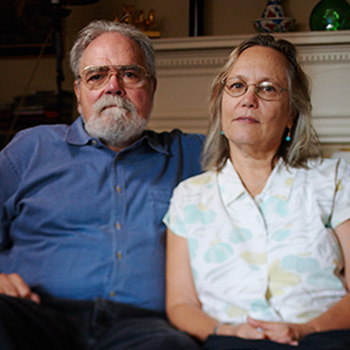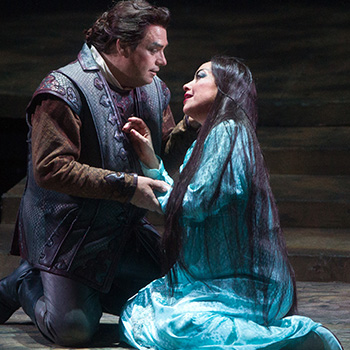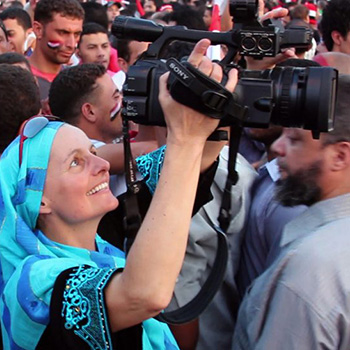 Thursday, September 8 at 9 pm. This is an intimate portrait of Phyllis and Orlando Rodríguez, whose son Greg dies with thousands of others in the World Trade Center on September 11, 2001. The bereaved parents choose reconciliation and nonviolence over vengeance and begin a transformative journey that both confirms and challenges their convictions.
Thursday, September 8 at 9 pm. This is an intimate portrait of Phyllis and Orlando Rodríguez, whose son Greg dies with thousands of others in the World Trade Center on September 11, 2001. The bereaved parents choose reconciliation and nonviolence over vengeance and begin a transformative journey that both confirms and challenges their convictions.
They speak out against war in Iraq and Afghanistan, publicly oppose the death penalty of avowed 9/11 conspirator Zacarias Moussaoui and befriend his mother. As their search for meaning evolves they speak out against anti-Muslim actions and find peace in working with prison inmates.
Their marriage strengthens, and they reach a deeper understanding of their rebellious son, who had just begun to find his way when his life was cut short. The film mixes in-depth interviews with on-location footage and striking archival photographs and video to create a deeply personal story that invites us to re-consider conventional concepts of justice and healing.
 Wednesday, August 3 at 8 pm. Swedish dramatic soprano Nina Stemme sings the demanding title role of Puccini’s imperious Chinese princess, with Anita Hartig as the angelic slave girl Liù. Marco Berti sings Calàf, the suitor who risks his head for Turandot’s hand, and Alexander Tsymbalyuk sings Timur. Paolo Carignani conducts Franco Zeffirelli‘s visually stunning 1987 production.
Wednesday, August 3 at 8 pm. Swedish dramatic soprano Nina Stemme sings the demanding title role of Puccini’s imperious Chinese princess, with Anita Hartig as the angelic slave girl Liù. Marco Berti sings Calàf, the suitor who risks his head for Turandot’s hand, and Alexander Tsymbalyuk sings Timur. Paolo Carignani conducts Franco Zeffirelli‘s visually stunning 1987 production.
The opera, which premiered at La Scala, Milan in 1926, is an epic fairy tale set in a China of legend. Featuring a most unusual score with an astounding and innovative use of chorus and orchestra, it is still recognizably Puccini, bursting with instantly appealing melodies. The unenviable task of completing the opera’s final scene upon Puccini’s sudden death was left to the composer Franco Alfano.
The story has its roots in various folk tales about a princess who tests the worthiness of her suitors by posing a series of riddles and who has those who answer incorrectly killed. The characters of Ping, Pang, and Pong are descended from the Italian tradition of commedia dell’arte that influenced much of the opera and drama of the 20th century.
Reviewing the present production, The New York Times noted that “[Nina Stemme] managed to render the grisly ice maiden surprisingly vulnerable… Her powerful, luxuriant voice retained its warmth throughout the evening, with blazing high notes that were never forced or shrill, even when projected over the massed ensembles of orchestra and chorus… The soprano Anita Hartig sang beautifully as the self-sacrificing Liu, her alluring voice plaintive and expressive; the rich-voiced bass-baritone Alexander Tsymbalyuk rendered Timur with dignity. Paolo Carignani conducted a lithe and detailed reading of Puccini’s sumptuous score.”
 Monday & Tuesday, August 1 & 2 at 9 pm. For three months, adventure filmmaker and author Karin Muller traveled alone across Egypt—living with Cairo's garbage collectors, drinking tea with camel sellers, and fasting through the blistering heat of Islam's Holy Month. She was in Tahir Square during the revolution, recording ordinary people's struggle to emerge from six decades of brutal dictatorship, fear, and propaganda.
Monday & Tuesday, August 1 & 2 at 9 pm. For three months, adventure filmmaker and author Karin Muller traveled alone across Egypt—living with Cairo's garbage collectors, drinking tea with camel sellers, and fasting through the blistering heat of Islam's Holy Month. She was in Tahir Square during the revolution, recording ordinary people's struggle to emerge from six decades of brutal dictatorship, fear, and propaganda.
August 1 - Part 1: Cairo, Undercover. Karin begins her journey in a Cairo slum among Egypt's 50,000 Coptic Christian garbage collectors, known as the Zabaleen. Cairo recycles a higher percentage of its refuse than any other city in the world. For two weeks Karin sorts garbage amidst the flies and pigs. The Zabaleen take her into their homes, teach her how to survive off Cairo's waste and show her just how much you can learn about a culture from what it throws away. They allow her into their backyard workshops, share their struggles with a hostile government, and reveal the secret of their happiness in the midst of Cairo's filthiest slum.
The Egyptians refer to Cairo as Um-Ad-Dunya—the Mother of the World. It is home to 22 million people, and over 60% of the city has developed in a completely unregulated free-for-all. As a result many neighborhoods are extraordinarily dense, leaving little room for schools, hospitals, or police stations. Streets are often too narrow for a fire truck or even an ambulance So where do you go if you live in a Cairo slum and yearn to see a tree or two? Al-Azhar Park—built, appropriately, on a garbage dump. For many children, it's their first experience with real grass. It's also a popular retreat for young couples looking for a bit of privacy, despite its proximity to the ultra-conservative Islamic Cairo.
Cairo is justifiably proud of its metro system—one of only two in all of Africa. It's efficient, inexpensive, and—even in the middle of a revolution—never breaks down. Each train has several carriages reserved for women, making it one of the safest forms of transportation in all of Egypt. The metro is the city's saving grace, because the one thing you don't want to do in Cairo is drive.
You will never truly understand Egypt if you don't understand Islam, and Ramadan—Islam's holiest month—is the time to do it. To Muslims, Ramadan is Christmas and Thanksgiving all rolled into one. Throughout Egypt, strangers are invited to share Iftar, the breaking of the daily fast. During Ramadan, Muller is given access to life behind the walls of one of Cairo's more conservative mosques, where she discovers an unexpected world of workout gyms and boxing clubs, libraries, and theatre groups.
August 2 - Part 2: The Gathering Storm. Karin begins her second journey in Upper Egypt, at an unusual Muslim celebration—a birthday party for Luxor's most famous saint. Huge processions fill the streets, but the heart of the festival is its elaborate fruit-filled floats. Fruit fights erupt at every corner, with bystanders hoping to catch a piece or two. For an entire day the locals dance in the street, wearing wigs and masks, their bodies painted blue. Hidden alleyways host bouts of Tahtib—ancient Muslim stick-fighting—and the central square is packed with children's rides, stalls selling toys and comfort foods, and even the occasional illicit gambling booth. But not everyone in Luxor is partying until late into the night.
Lucie, a young French archeologist, has spent the last two years in Luxor, learning to speak Arabic and becoming a part of her Luxor neighborhood. Lucie has come to appreciate Egyptian family values and her neighbors have tried—unsuccessfully—to develop a taste for blue cheese. The village men are mostly poor farmers and Nile fishermen, barely surviving despite the government subsidy of wheat and fuel. Once a week the men attend the local livestock market—Egypt's equivalent of a Monday night football game. The bargaining can go on for hours, but after the deal is done everyone shares a cup of tea and a sheesha pipe. The topic of conversation is often Cairo—a magnet for poor rural Egyptians struggling to make ends meet. For those brave enough to make the journey, the odds are not in their favor. Unemployment is close to 30%. The few who do well have found a trade, like the ubiquitous roaming hibiscus tea sellers.
In Cairo, the coffee house is the only establishment more common than a mosque. It's a male-only bastion where Egyptians from all walks of life gather to smoke, play backgammon, and argue politics. Revolutions are born in Cairo's coffee houses. Karin spends long evening with university students and local mullahs, piecing together the real story behind Egypt's quest for democracy.
While the men are arguing over coffee, the women are usually out shopping. Most Egyptian women wear abeyas—robe-like dresses worn throughout the Muslim world. They may all look the same to Westerners, but there are in fact dozens of different styles. Since the abeya covers everything except the hands and feet, it's not surprising that Egyptian women are obsessed with shoes and handbags, even if they have to buy them in Cairo's second-hand markets.
Not everyone in Egypt is struggling to make ends meet. Cairo's wealthier inhabitants can be found at local sports competitions or trying out the latest Western fads and fashions. Break dancing is popular, but the runaway hit in Cairo is Zumba. The women don't seem the least bit shy or inhibited but - even more surprising - neither are the men. Despite their tough-boy image, they're not the least big afraid of making fun of themselves.
Over the past few years, Egyptians, both rich and poor, have developed a new favorite pastime—revolution. For five days Karin lives in the tents in Tahrir Square and captures a uniquely personal view of the fateful revolution that will bring all Egyptians together and then tear them apart. Men and women, old and young, Muslim and Christian—the whole of Cairo turns out in an electrifying time of incredible hope and expectation. Until the military steps in. In a classic coup, they remove the President from power. The Muslim Brotherhood immediately sets up camp in nearby Rabaa Mosque and the stage is set for confrontation. Egypt is suddenly on the brink of civil war.
Karin leaves the escalating violence for the more peaceful countryside. But even here rage and fear have infected the population. Muller survived the revolution and military coup, only to be attacked by a spontaneous mob in a remote village in the Nile delta. Seriously injured, she is medevacked back to the States for emergency surgery. Egypt: The Gathering Storm reveals the many faces of this complicated land.
 Fridays at 9 pm. Anchored by public radio’s Brian Lehrer, POTUS 2016 is designed to satisfy public television viewers’ hunger for serious, in-depth election coverage. POTUS 2016 is unique for being a regularly scheduled program solely devoted to the campaign season.
Fridays at 9 pm. Anchored by public radio’s Brian Lehrer, POTUS 2016 is designed to satisfy public television viewers’ hunger for serious, in-depth election coverage. POTUS 2016 is unique for being a regularly scheduled program solely devoted to the campaign season.
A regular segment, “Evidence-Based Politics,” will look deeply into one timely campaign issue with a researcher who has published a rigorous study on the subject, countering half-truths and exaggerations with hard information.
The program has a rotating group of regulars, including Steve Forbes, editor-in-chief of Forbes magazine; Gail Collins, New York Times columnist; Ta-Nehisi Coates, senior editor for The Atlantic; Law Professor Zephyr Teachout; and campaign finance expert and former gubanatorial candidate Mark Hugo Lopez of the Pew Research Center.
- As Time Goes By
- Grantchester, Season 2
- New Season of Natural Heroes on KRCB
- Piaf: Her Story, Her Songs
- Holiday Programs for Kids
- American Music on KRCB
- NEW! InCommon with Mike Leonard
- Community Health Connections: Building a Better Society
- Masterpiece Contemporary: The Song of Lunch
- Austin City Limits: B.B. King
- Great Performances: Annie Lennox, Nostalgia Live in Concert.
- The Best of the Boston Pops
- Sand Wars
- Frontline: The Rise of Isis
- Great Performances: La Dolce Vita: The Music of Italian Cinema
- What Love Is - The Duke Pathfinders 50 - old
- Metropolitan Opera Encores
- Great Performances: At The Met
- Jackie Evancho, Awakening: Live In Concert
- 50 Years with Peter, Paul and Mary
- Sam Harris on Between the Lines
- Beyond These Walls: Building Community Through Public Art
- Choctaw Code Talkers
- Masterpiece Mystery! Death Comes to Pemberley
- Treading Water
- KRCB Local Election Coverage 2014
- Tony Bennett and Lady Gaga: Cheek to Cheek
- Bombs Away: LBJ, Goldwater, and the 1964 Campaign That Changed It All
- Twisted Tales of Poe: The Black Cat
- A Friend Indeed: The Bill Sackter Story
- Harvest
- Masterpiece Mystery! Miss Marple, Season 7
- Who Cares about Kelsey?
- Latino Americans
- Masterpiece Classic: The Mystery of Edwin Drood
- Rick Steves' Europe: Travel Skills
- Power for the Parkinsons
- Theodore Roosevelt: A Cowboy's Ride to the White House
- How Washington Really Works: Charlie Peters & The Washington Monthly
- Shift Change

 Live Radio
Live Radio